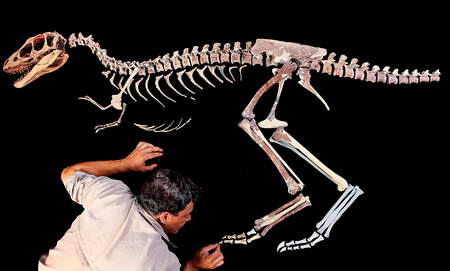Global Times: Fools' paradise for fossil hunters
By Xie Ying

University of Chicago paleontologist Paul Sereno adds the toe claw to a well-preserved skeleton of the new tyrannosaur Raptorex. The relatively tiny new ancestor of the Tyrannosaurus rex was reportedly unearthed in China and smuggled out of the country. Photos: AFP
If Charles Darwin were alive today he might come to the Middle Kingdom instead of the Galapagos Islands to finish On the Origin of Species, the 150th anniversary of which is being celebrated worldwide.
Many fossils being unearthed in China have shed light on the mysteries of origins: Those from the mountains of the southwest have pushed the beginning of complex life back by at least 40 million years, scientists claimed in a paper published in the US Proceedings of the National Academy of Sciences on October 20.
Fossils of a man-sized forerunner to the colossal Tyrannosaurus rex (T. rex), which were found at an ancient lakebed in Northeast China, also made some scientists think that the evolution of the most fearsome predator in history had started 60 million years earlier than previously believed, according to a paper that appeared in the US journal Science on October 16.
As China's fossils become ever more important, smugglers and fossil raiders are having a carnival. Chinese fossils have suffered from indiscriminate digging since the 1980s when dinosaur eggs were found in Henan Province, Li Jinling, a paleontologist and vice director general of the China Fossil Preservation Foundation, told the Global Times.
Actually, the fossils of the mini T. rex were smuggled out of China. An American eye surgeon Henry Kriegstein reportedly telephoned researchers to say he had bought the fossil from a trader and Paul Sereno, a University of Chicago researcher, agreed to document them on condition they are returned to China afterwards.
Smuggling is rife. More than 100 Confuciusornis primitive bird fossils have been smuggled from China to the US, while domestic Chinese museums boast only 20, a customs officer told China Land and Resources News two years ago.
Black market
There was once reportedly an exchange market in Liaoning Province with valuable fossils displayed in stalls. Through government crackdowns, fossils disappeared from open market and into the black market, according to CCTV.com.
A bird fossil unearthed in Liaoning Province of North China can sell for four or five times its original price on the black market down south. Some fossils even sell for several hundred million yuan on the international market. The enormous money to be made attracts countless speculators.
China's best-known collectibles market – Panjiayuan in Beijing – was once reportedly full of fossils, mostly fake. When the Global Times reporter visited, the market was bustling with visitors skimming through faux antiques, books, pictures, jewelry, jade and stone.
But unlike it was widely reported a few years ago, few fossils were to be seen. In a row of shops selling jade, stone and porcelain, the reporter stopped and asked, "Do you have dinosaur eggs?"
"No. That's illegal," a quick reply came. "Some vendors tried to peddle these things to me, but I refused."
Download attachments: